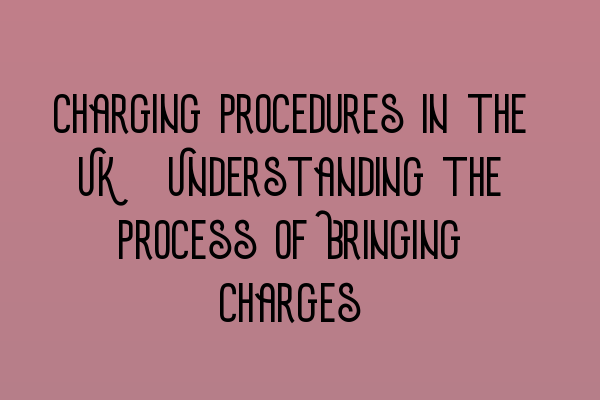Charging Procedures in the UK: Understanding the Process of Bringing Charges
Bringing charges against individuals accused of criminal offenses is a crucial aspect of the legal system in the UK. It is essential to have a comprehensive understanding of the charging procedures involved to ensure a fair and effective criminal justice process. This article will provide an overview of the process of bringing charges in the UK.
Step 1: Investigation
The process typically begins with an investigation conducted by law enforcement agencies, such as the police. During this stage, evidence is gathered, witnesses are interviewed, and any potential suspects are identified. The investigation aims to establish enough evidence to support the decision to bring charges against an individual.
Step 2: Arrest
If the investigation leads to sufficient evidence, the police may decide to arrest the suspect. This involves taking the individual into custody and informing them of the reasons for their arrest. It is crucial to ensure that arrests are made in accordance with the laws and regulations governing the arrest process.
Step 3: Charging Decision
After the arrest, the evidence gathered during the investigation is reviewed by the appropriate prosecuting authority, such as the Crown Prosecution Service (CPS). The prosecutor evaluates the evidence to determine whether there is a realistic prospect of conviction and if it is in the public interest to proceed with the charges.
Step 4: Charging
If the prosecutor decides to bring charges, they will draft a document known as an ‘indictment’ or ‘charge sheet.’ This document outlines the specific offenses the accused is charged with and sets out the details of the alleged criminal activity. The charge sheet is then served to the defendant.
Step 5: Court Proceedings
Once the charges have been filed, the case progresses to the court system. The defendant will be summoned to attend court for an initial hearing, where the charges will be formally presented. The court will then schedule subsequent hearings, including pre-trial hearings and the trial itself.
Step 6: Plea and Trial
During the trial, the defendant has the opportunity to enter a plea of guilty or not guilty. If a guilty plea is entered, the case proceeds to the sentencing phase. If the defendant pleads not guilty, a trial will be conducted to determine their guilt or innocence. The trial involves presenting evidence and arguments from both the prosecution and defense.
Step 7: Verdict and Sentencing
Once the trial is complete, the judge or jury will deliver a verdict based on the evidence presented. If the defendant is found guilty, the court will proceed to sentencing, where the appropriate punishment will be determined based on the severity of the offense and any applicable sentencing guidelines.
Conclusion
Understanding the charging procedures in the UK is crucial to navigate the criminal justice system effectively. From the initial investigation to the final verdict and sentencing, each step plays a vital role in ensuring a fair and just outcome. If you are interested in learning more about criminal law in the UK, check out our related articles:
